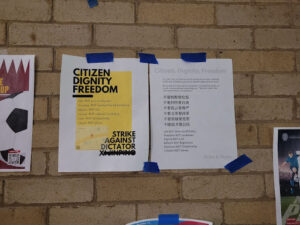Georgetown and 85 other universities filed an amicus brief in support of the plaintiffs in American Association of University Professors (AAUP) v. Rubio, which challenges the Trump administration’s high-profile arrests of non-citizens and revocations of international students’ visas. The brief, which was filed on April 9, argues that the Trump administration’s policies have created a climate of fear that harms the U.S. economy and its quality of education.
The amicus brief was filed by the Presidents’ Alliance on Higher Education and Immigration, which consists of 570 university presidents and chancellors. Of the organization’s members, 86 universities, including Georgetown, are listed as supporting the brief.
A university spokesperson told the Voice that Georgetown’s values and Jesuit identity helped inspire the university to support the brief.
“Central to Georgetown’s mission as a Catholic and Jesuit institution and guided by Georgetown’s founding as a university for students of all faiths, Georgetown promotes interreligious understanding and dialogue among community members of all religious and non-religious backgrounds,” the spokesperson wrote in a statement to the Voice.
An amicus brief is a legal document filed by individuals or organizations who have a strong interest in the matter to advocate for a certain outcome—in this case, other universities whose students are also affected by the Trump administration’s policies. The court may consider an amicus brief’s arguments in its decision-making process.
The brief was filed on the same day that Georgetown quietly published an update on an Office of Global Studies webpage announcing that the federal government has terminated the immigration statuses of about six Georgetown community members.
In the suit, AAUP argues that the Trump administration’s “ideological-deportation policy” violates the First Amendment, Fifth Amendment, and the Administrative Procedure Act. Additionally, it requests that the Massachusetts District Court prohibit the Trump administration from threatening non-citizen students or faculty based on political viewpoints or enforcing the policy through investigation, surveillance, arrest, detention, and deportation.
The case names several faculty members of higher education institutions including Yale Law School, the City University of New York, and Columbia University among its plaintiff members.
The amicus brief supports the AAUP’s motion for a preliminary injunction, which would effectively end deportations, arrests, and detainments of students and faculty based on their lawful political expression until a judge is able to rule on the case.
“By means of this brief, the Presidents’ Alliance supports the AAUP’s motion for a preliminary injunction to safeguard academic freedom and halt large-scale arrests, detentions, and deportations of students and faculty engaged in constitutionally–protected activities,” the Presidents’ Alliance wrote in an April 10 press release.
The Massachusetts District Court will hear the motion for the preliminary injunction on Wednesday, April 23.
The brief mentions the administration’s recent high-profile arrests of non-citizens, including Georgetown postdoc Dr. Badar Khan Suri, as examples of the targeting of non-citizens based on their purported political views.
The brief argues that these arrests and other threats against non-citizens create a climate of fear that will ultimately harm the U.S. institutions and the economy.
“It will harm the American economy, limiting the economic contributions made by hundreds of thousands of non-citizens. Because of the high concentration of non-citizens in scientific and technological fields, it will hurt American research and innovation. And it will exacerbate the troubling trend of top foreign students choosing non-US institutions over American schools—handing a competitive advantage to other countries,” the brief writes.
A similar amicus brief was also filed on the same day in the same case by another group of institutions, including the Council of University of California Faculty Associations and the AAUP chapters of Brown University, Princeton University, the Massachusetts Institute of Technology, Yale University, and more. The brief warns that the Trump administration’s current targeting of individuals critical of Israel’s invasion of Gaza is only one manifestation of its threats.
“Although the earliest targets of Defendants’ program appear to be people whom the government believes harbor certain views regarding Israel, Palestine, Gaza, and the United States’ relationship thereto, they are not its only victims,” the brief wrote, “A future administration could use the same tools against its own ideological opponents, whatever the issue may be.”






